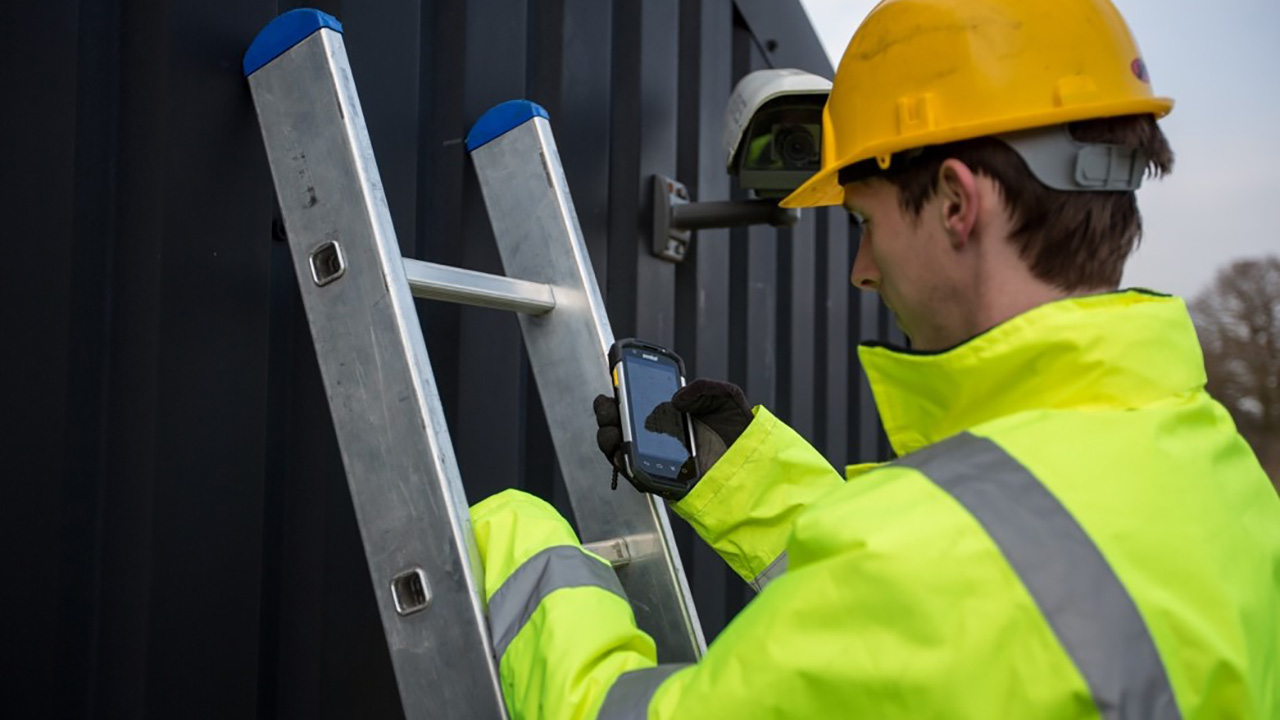Transform retail operations with Zebra’s retail technology solutions, featuring hardware and software for improving inventory management and empowering teams.
Streamline operations with Zebra’s healthcare technology solutions, featuring hardware and software to improve staff collaboration and optimise workflows.
Enhance processes with Zebra’s manufacturing technology solutions, featuring hardware and software for automation, data analysis, and factory connectivity.
Zebra’s transportation and logistics technology solutions feature hardware and software for enhancing route planning, visibility, and automating processes.
Zebra's hospitality technology solutions equip your hotel and restaurant staff to deliver superior customer and guest service through inventory tracking and more.
Zebra's market-leading solutions and products improve customer satisfaction with a lower cost per interaction by keeping service representatives connected with colleagues, customers, management and the tools they use to satisfy customers across the supply chain.
Empower your field workers with purpose-driven mobile technology solutions to help them capture and share critical data in any environment.
Zebra's range of mobile computers equip your workforce with the devices they need from handhelds and tablets to wearables and vehicle-mounted computers.
Zebra's desktop, mobile, industrial, and portable printers for barcode labels, receipts, RFID tags and cards give you smarter ways to track and manage assets.
Zebra's 1D and 2D corded and cordless barcode scanners anticipate any scanning challenge in a variety of environments, whether retail, healthcare, T&L or manufacturing.
Zebra's extensive range of RAIN RFID readers, antennas, and printers give you consistent and accurate tracking.
Choose Zebra's reliable barcode, RFID and card supplies carefully selected to ensure high performance, print quality, durability and readability.
Zebra's location technologies provide real-time tracking for your organisation to better manage and optimise your critical assets and create more efficient workflows.
Zebra's rugged tablets and 2-in-1 laptops are thin and lightweight, yet rugged to work wherever you do on familiar and easy-to-use Windows or Android OS.
With Zebra's family of fixed industrial scanners and machine vision technologies, you can tailor your solutions to your environment and applications.
Zebra’s line of kiosks can meet any self-service or digital signage need, from checking prices and stock on an in-aisle store kiosk to fully-featured kiosks that can be deployed on the wall, counter, desktop or floor in a retail store, hotel, airport check-in gate, physician’s office, local government office and more.
Discover Zebra’s range of accessories from chargers, communication cables to cases to help you customise your mobile device for optimal efficiency.
Zebra's environmental sensors monitor temperature-sensitive products, offering data insights on environmental conditions across industry applications.
Enhance frontline operations with Zebra’s AI software solutions, which optimize workflows, streamline processes, and simplify tasks for improved business outcomes.
Zebra Workcloud, enterprise software solutions boost efficiency, cut costs, improve inventory management, simplify communication and optimize resources.
Keep labour costs low, your talent happy and your organisation compliant. Create an agile operation that can navigate unexpected schedule changes and customer demand to drive sales, satisfy customers and improve your bottom line.
Drive successful enterprise collaboration with prioritized task notifications and improved communication capabilities for easier team collaboration.
Get full visibility of your inventory and automatically pinpoint leaks across all channels.
Reduce uncertainty when you anticipate market volatility. Predict, plan and stay agile to align inventory with shifting demand.
Drive down costs while driving up employee, security, and network performance with software designed to enhance Zebra's wireless infrastructure and mobile solutions.
Explore Zebra’s printer software to integrate, manage and monitor printers easily, maximising IT resources and minimising down time.
Make the most of every stage of your scanning journey from deployment to optimization. Zebra's barcode scanner software lets you keep devices current and adapt them to your business needs for a stronger ROI across the full lifecycle.
RFID development, demonstration and production software and utilities help you build and manage your RFID deployments more efficiently.
RFID development, demonstration and production software and utilities help you build and manage your RFID deployments more efficiently.
Zebra DNA is the industry’s broadest suite of enterprise software that delivers an ideal experience for all during the entire lifetime of every Zebra device.
Advance your digital transformation and execute your strategic plans with the help of the right location and tracking technology.
The Zebra Aurora suite of machine vision software enables users to solve their track-and-trace, vision inspection and industrial automation needs.
Zebra Aurora Focus brings a new level of simplicity to controlling enterprise-wide manufacturing and logistics automation solutions. With this powerful interface, it’s easy to set up, deploy and run Zebra’s Fixed Industrial Scanners and Machine Vision Smart Cameras, eliminating the need for different tools and reducing training and deployment time.
Aurora Imaging Library™, formerly Matrox Imaging Library, machine-vision software development kit (SDK) has a deep collection of tools for image capture, processing, analysis, annotation, display, and archiving. Code-level customisation starts here.
Aurora Design Assistant™, formerly Matrox Design Assistant, integrated development environment (IDE) is a flowchart-based platform for building machine vision applications, with templates to speed up development and bring solutions online quicker.
Designed for experienced programmers proficient in vision applications, Aurora Vision Library provides the same sophisticated functionality as our Aurora Vision Studio software but presented in programming language.
Aurora Vision Studio, an image processing software for machine & computer vision engineers, allows quick creation, integration & monitoring of powerful OEM vision applications.
Adding innovative tech is critical to your success, but it can be complex and disruptive. Professional Services help you accelerate adoption, and maximise productivity without affecting your workflows, business processes and finances.
Zebra's Managed Service delivers worry-free device management to ensure ultimate uptime for your Zebra Mobile Computers and Printers via dedicated experts.
Find ways you can contact Zebra Technologies’ Support, including Email and Chat, ask a technical question or initiate a Repair Request.
Zebra's Circular Economy Program helps you manage today’s challenges and plan for tomorrow with smart solutions that are good for your budget and the environment.

Why Your Field Operations Need Enterprise Mobile Technology
Online reviews. Social media. Order tracking. Technology continues to create new opportunities for consumers and companies. And as the world becomes more digitized and more connected, companies need to similarly transform their field operations if they want to compete.
From our new Future of Field Operations Vision Study, we learned that many leading field organizations are raising their performance edge with mobile technology. Sixty percent consider their field operations strategies to be “mobile first.” However, that number really should be 100 percent. Mobility is essential to workforce and organizational agility in this on-demand era.
More effective field operations with enterprise mobile technology
Our study revealed that leading organizations are placing enterprise mobile technology in the hands of their front-line workers. By 2023, 50 percent will have equipped most of their field teams.
Mobility gives field teams the ability to do more work with the same amount of resources. They can accept mobile payments and maximize cash flow and perform scheduled preventative maintenance or deliveries by proactively setting appointments.
The benefits
Enterprise mobile technology doesn’t just enable field teams to be more effective. About 85 percent of companies surveyed say it increases employee productivity and efficiency. And within the next three years, this will rise by nearly 15 percent.
Survey respondents indicated that they use an average of 2,100 enterprise mobile devices within their organizations today. By 2023, this is projected to grow to about 3,500 devices deployed. And the most popular investments of mobile-first operations are barcode scanner-equipped handheld mobile computers and rugged tablets.
Teams equipped with handheld mobile computers that have barcode scanning capabilities can quickly and accurately conduct document inspections in real time. Ruggedized tablets allow fleet managers to access schematics wherever they go—whether out in the field or in harsh work environments. Cloud computing enables workers to access work orders or other large data quickly and securely. And that’s just the start.
With more capabilities, teams can enhance their customer service, increase revenue, achieve regulatory compliance and so much more.
Download the full Future of Field Operations Vision Study today to learn from mobile-first industry leaders and understand how you can emulate their plans to help your organization capture its edge in 2019 and beyond.

Jim Hilton
Jim Hilton leads Zebra’s global vertical strategy in Manufacturing, Transportation and Logistics in primary segments of the local markets worldwide. He helps businesses within these industries intelligently connect company assets, data and people in collaborative workflows through innovative Zebra products, software, services, analytics and solutions—enabling them to sense what’s happening, analyze or anticipate the outcome and make best-action decisions in real time.
Having worked in the technology industry for more than 35 years, Mr. Hilton brings a unique vision to the real-world use of technology and its powerful advantage in driving customer success. He helps to give organizations the competitive edge they need to simplify operations, know more about their businesses and customers and empower their mobile workers to succeed in today’s data-centric world.
Mr. Hilton’s hands-on career in manufacturing and logistics entails route sales, distribution, corporate management and deployment of major technology initiatives. He was responsible for the successful deployment and use of what was recognized as breakthrough “automated distribution systems” in the early 1980s. He later transitioned to managing, deploying and training on distribution systems across 30-plus subsidiaries of a major global food and beverage company, as well as managing major deployment projects across the consumer-packaged goods industry.
Today, Mr. Hilton helps organizations look to this next industrial revolution and demystifies what it means to become Industrial Internet of Things (IIoT) compliant in order to connect goods, assets, people, places and processes to unlock the hidden potential of the organization. In turn, customers are able to modernize the warehouse or make the transition to Manufacturing 4.0. Through Zebra, Mr. Hilton is able to assist operations in identifying where they are now and where they need to be as we works with them to devise a realistic plan for implementation.
Mr. Hilton holds a Bachelor of Science degree from the University of Kentucky, College of Business and Economics, and lives in Lexington, Kentucky.
Zebra Developer Blog
Zebra Developer Blog
Are you a Zebra Developer? Find more technical discussions on our Developer Portal blog.
Zebra Story Hub
Zebra Story Hub
Looking for more expert insights? Visit the Zebra Story Hub for more interviews, news, and industry trend analysis.
Search the Blog
Search the Blog
Use the below link to search all of our blog posts.
Most Recent
Legal Terms of Use Privacy Policy Supply Chain Transparency
ZEBRA and the stylized Zebra head are trademarks of Zebra Technologies Corp., registered in many jurisdictions worldwide. All other trademarks are the property of their respective owners. ©2025 Zebra Technologies Corp. and/or its affiliates.






